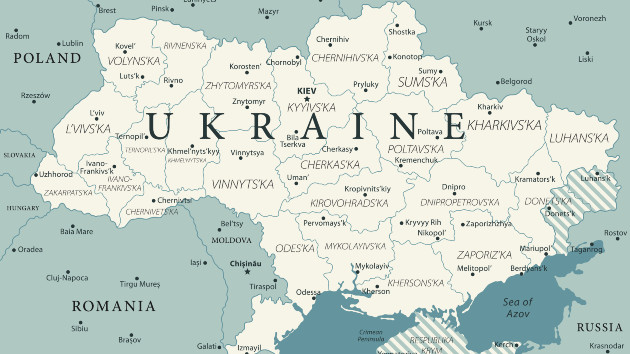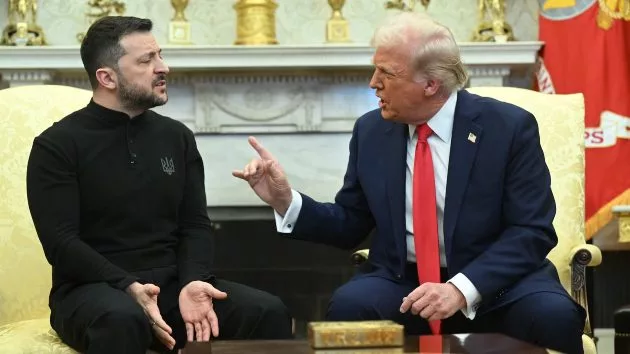
(NEW YORK) — In the Ukraine conflict, reports of civilian casualties have dominated the headlines as Russian troops siege cities around the country.
Civilian buildings have been hit by Russian forces, with hospitals and residential buildings shelled, causing thousands of civilian casualties and massive human suffering.
Russia has denied they are deliberately targeting civilians and insisted in some cases that enemy fighters were hiding within the buildings.
Russia is also reported to have used unguided “dumb” bombs in Ukraine, which greatly increase the risk of missing targets and hitting civilian infrastructure.
Many countries, including the United States, along with independent monitors, like Amnesty International, have condemned Russia’s actions.
“We’ve all seen the devastating images coming out of Ukraine and are appalled by Russia’s brutal tactics,” White House deputy press secretary Andrew Bates said Friday. “Pregnant women on stretchers, apartment buildings — buildings shelled, families killed while seeking safety from this terrible violence. These are disgusting attacks; civilian casualties are increasing. If Russia is intentionally targeting civilians, that would be a war crime.”
But whether or not these attacks constitute war crimes has been debated. U.S. officials and the United Nations have been more reserved, saying legal assessments must be done, but Ukrainian officials have clearly condemned Russia’s attacks as violations of international humanitarian law.
Making matters murkier is the issue of civilians taking up arms to resist the Russian advance and the fact that the front lines often disappear in the realm of urban warfare.
Here’s what you need to know about the laws of war pertaining to civilians:
Civilians off limits, except when they take up arms
In an armed conflict, countries are not allowed to deliberately target or indiscriminately attack civilians, the civilian population or civilian properties, according to the rules of international humanitarian law, or IHL.
IHL covers the rules of war, specifying what parties can and can’t do during an armed conflict. The Geneva Conventions, four treaties adopted in 1949 and signed by 196 countries, are the core of IHL, according to the humanitarian organization International Committee of the Red Cross. Additional protocols were later adopted in 1977 and 2005. The conventions and protocols regulate the conduct of armed conflict and seek to minimize its effects.
Russia signed Protocol 1 in 1977, but Russian leader Vladimir Putin revoked Russia’s acceptance in October 2019, citing potential abuse of a commission set up to investigate war crimes.
But the protections for civilians who participate in an armed conflict by taking up arms are different, Allen Weiner, the director of the Stanford Program in International and Comparative Law, told ABC News.
“The rule is that civilians can be targeted, but only for such time as they are directly taking part in hostilities. So while a civilian is shooting at you, they become a permissible target. When they go back home, they cease to be permissible target under the law of armed conflict,” Weiner said.
Principles of distinction, proportionality, precautions
Under the Geneva Conventions, signatory states must abide by the IHL principles of distinction, proportionality and precautions during an armed conflict.
Distinction requires all sides to distinguish between civilian populations and combatants at all times, including distinguishing between civilian and military infrastructures, according to the ICRC.
This distinction is important, as the rules of war forbid countries from launching attacks on civilians and civilian objects or even launching indiscriminate attacks that hit military targets and civilians or civilian objects without distinction.
“Essential infrastructure must be spared, including water, gas and electrical systems that, for instance, provide civilian homes, schools and medical facilities with vital water and electricity supplies,” the ICRC told ABC News.
Russia, for instance, has captured the Chernobyl and Zaporizhzhia nuclear power plants and attacked at least 26 health care facilities, the Office of the U.N. High Commissioner for Human Rights, or OHCHR, said last week. Russia has also hit other gas and electric infrastructure.
“There’s not really different tiers of immunity; civilian objects are immune, period. So a civilian house is immune, a school is immune and a hospital is immune. And there’s really only one degree of immunity, which is, it can’t be targeted,” Weiner said.
The ICRC said that the use of “weapons with wide area effects must be avoided in populated areas” and that “attacks carried out with new technologies and cyber means must also respect international humanitarian law.”
The Russian army has been accused of using cluster bombs by Ukraine, including at Central City Hospital in Vuhledar on Feb. 24, reports the Office of the OHCHR called “credible.”
Proportionality prohibits states from launching attacks against military targets if the attack is expected to cause incidental loss of civilian life, injury to civilians or damage to civilian objects. Attacks may only be launched against a military objective if the potential civilian losses are not expected to outweigh the foreseen military advantage, according to the ICRC.
Parties to a conflict must “at all times take action to minimize civilian harm,” Cordula Droege, the chief legal officer for the ICRC, told ABC News in an interview.
In a conflict, countries are required to take constant precautions to spare civilians and their objects, which includes doing everything possible to verify that targets are military objects and giving advance warning of attacks that may affect the civilian population when possible, according to the ICRC.
“Civilians should be spared,” Droege said.
Consequences
There are consequences for breaking the rules of war. War crimes are documented and investigated by governments and international courts, such as the International Criminal Court. Individuals can also be prosecuted for war crimes, according to the ICRC.
Russia has been accused of targeting civilians and civilian infrastructures during its invasion of Ukraine, which is considered illegal under international law. Russia has denied the accusations and in some cases claimed enemy fighters were hiding behind civilians and in civilian buildings.
U.S. Secretary of State Antony Blinken accused Russia of hitting civilian targets in Ukraine, killing innocent people and destroying hospitals, schools and critical infrastructure such as running water, electricity and gas, all of which is protected under international law.
But while the U.S. has said it is documenting the incidents, officials have stopped short of saying Russia is guilty of war crimes.
“States are obligated to prosecute people who commit these crimes. … If the Russians are doing it, they have a legal obligation to prosecute their own,” Weiner said. “A lot of militaries do actually prosecute their own people if they violate the rules.”
The ICRC is “extremely worried about the protection of civilians” in Ukraine, Droege said.
“We are engaging all parties to the conflict on a bilateral and confidential dialogue to ensure they abide by their [IHL] obligations, including the respect of civilian objects, such as essential infrastructure, and, more broadly, all other IHL rules on the conduct of hostilities,” the ICRC said.
Even though Ukraine did not sign on to be a party to the International Criminal Court, it issued a declaration recognizing the jurisdiction of the court in 2015 — a year and a half after Russian forces first invaded Ukraine, seizing the Crimean Peninsula and launching a separatist war in the eastern provinces Donetsk and Luhansk.
That declaration gives the ICC the ability to prosecute criminal cases in the country, while the Ukrainian government has also said it is collecting evidence to be able to prosecute Russian service members they capture who have violated IHL.
Theoretically, Weiner said, there could be a prosecution of Russian soldiers or even Russia civilians in command of the army, such as the head of state or minister of defense, in the case of “ordering or directing these violations of international humanitarian law.”
While Weiner said the evidence gathered will show what, if any, violations of international humanitarian law have occurred, one thing is clear to him.
“This is really unusual in terms of being one of the most flagrant violations that I have seen of the basic idea that one country can’t simply invade another and try to take its territory by force, or to replace its government,” Weiner said.
Copyright © 2022, ABC Audio. All rights reserved.







